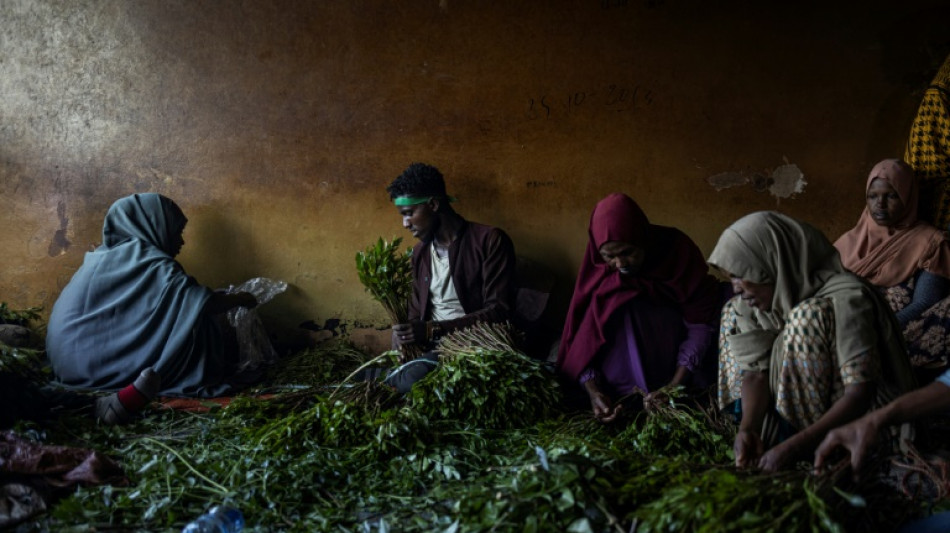
-
 Bad Bunny celebrates Puerto Rico at Super Bowl, angering Trump
Bad Bunny celebrates Puerto Rico at Super Bowl, angering Trump
-
Seahawks soar to Super Bowl win over Patriots

-
 'Want to go home': Indonesian crew abandoned off Africa demand wages
'Want to go home': Indonesian crew abandoned off Africa demand wages
-
Asian stocks track Wall St rally as Tokyo hits record on Takaichi win

-
 Hong Kong sentences pro-democracy mogul Jimmy Lai to 20 years in jail
Hong Kong sentences pro-democracy mogul Jimmy Lai to 20 years in jail
-
Bad Bunny celebrates Puerto Rico in joyous Super Bowl halftime show

-
 Three prominent opposition figures released in Venezuela
Three prominent opposition figures released in Venezuela
-
Japan PM Takaichi basks in historic election triumph

-
 Israeli president says 'we shall overcome this evil' at Bondi Beach
Israeli president says 'we shall overcome this evil' at Bondi Beach
-
'Flood' of disinformation ahead of Bangladesh election

-
 Arguments to begin in key US social media addiction trial
Arguments to begin in key US social media addiction trial
-
Gotterup tops Matsuyama in playoff to win Phoenix Open

-
 New Zealand's Christchurch mosque killer appeals conviction
New Zealand's Christchurch mosque killer appeals conviction
-
Leonard's 41 leads Clippers over T-Wolves, Knicks cruise

-
 Patriots-Seahawks Super Bowl approaches as politics swirl
Patriots-Seahawks Super Bowl approaches as politics swirl
-
Trump says China's Xi to visit US 'toward the end of the year'

-
 Real Madrid edge Valencia to stay on Barca's tail, Atletico slump
Real Madrid edge Valencia to stay on Barca's tail, Atletico slump
-
Malinin keeps USA golden in Olympic figure skating team event

-
 Lebanon building collapse toll rises to 9: civil defence
Lebanon building collapse toll rises to 9: civil defence
-
Real Madrid keep pressure on Barca with tight win at Valencia

-
 Dimarco helps Inter to eight-point lead in Serie A, Juve stumble
Dimarco helps Inter to eight-point lead in Serie A, Juve stumble
-
PSG trounce Marseille to move back top of Ligue 1

-
 Two prominent opposition figures released in Venezuela
Two prominent opposition figures released in Venezuela
-
Hong Kong to sentence media mogul Jimmy Lai in national security trial

-
 Lillard will try to match record with third NBA 3-Point title
Lillard will try to match record with third NBA 3-Point title
-
Vonn breaks leg as crashes out in brutal end to Olympic dream

-
 Malinin enters the fray as Japan lead USA in Olympics team skating
Malinin enters the fray as Japan lead USA in Olympics team skating
-
Thailand's Anutin readies for coalition talks after election win

-
 Fans arrive for Patriots-Seahawks Super Bowl as politics swirl
Fans arrive for Patriots-Seahawks Super Bowl as politics swirl
-
'Send Help' repeats as N.America box office champ

-
 Japan close gap on USA in Winter Olympics team skating event
Japan close gap on USA in Winter Olympics team skating event
-
Liverpool improvement not reflected in results, says Slot

-
 Japan PM Takaichi basks in election triumph
Japan PM Takaichi basks in election triumph
-
Machado's close ally released in Venezuela

-
 Dimarco helps Inter to eight-point lead in Serie A
Dimarco helps Inter to eight-point lead in Serie A
-
Man City 'needed' to beat Liverpool to keep title race alive: Silva

-
 Czech snowboarder Maderova lands shock Olympic parallel giant slalom win
Czech snowboarder Maderova lands shock Olympic parallel giant slalom win
-
Man City fight back to end Anfield hoodoo and reel in Arsenal

-
 Diaz treble helps Bayern crush Hoffenheim and go six clear
Diaz treble helps Bayern crush Hoffenheim and go six clear
-
US astronaut to take her 3-year-old's cuddly rabbit into space

-
 Israeli president to honour Bondi Beach attack victims on Australia visit
Israeli president to honour Bondi Beach attack victims on Australia visit
-
Apologetic Turkish center Sengun replaces Shai as NBA All-Star

-
 Romania, Argentina leaders invited to Trump 'Board of Peace' meeting
Romania, Argentina leaders invited to Trump 'Board of Peace' meeting
-
Kamindu heroics steer Sri Lanka past Ireland in T20 World Cup

-
 Age just a number for veteran Olympic snowboard champion Karl
Age just a number for veteran Olympic snowboard champion Karl
-
England's Feyi-Waboso out of Scotland Six Nations clash

-
 Thailand's pilot PM lands runaway election win
Thailand's pilot PM lands runaway election win
-
Sarr strikes as Palace end winless run at Brighton

-
 Olympic star Ledecka says athletes ignored in debate over future of snowboard event
Olympic star Ledecka says athletes ignored in debate over future of snowboard event
-
French police arrest six over crypto-linked magistrate kidnapping


A gloomy season for Ethiopia's 'green gold' at the khat market
"We call it green gold," says Ramadan Youssouf, a khat trader in the Ethiopian town of Aweday, one of the largest markets in the world for the mildly narcotic shrub.
"We use it in the morning to wake up, if you chew (it) you can never get sick," the 30-year-old tells AFP, his dilated pupils reflecting the effect of the stimulant, which is consumed across the Horn of Africa.
But this year, business is not giving khat traders much to smile about.
"The prices are too low," Mohamed Ibro, a 45-year-old trader, says with a grimace, after an unusually rainy dry season resulted in an overly abundant harvest.
Traders also complain about an increase in taxes and the recent tightening of conditions for exporters to obtain a commercial licence.
At the market in Aweday, located about 10 kilometres (six miles) outside the eastern city of Harar, trade is nonetheless in full swing.
Men carrying large green bundles on their shoulders jostle against each other as they walk down the narrow aisles packed with tin-roofed shacks selling khat and other products.
- Key export -
As farmers hand over their harvest, traders examine the leaves and weigh the bundles before they agree on a price.
There are no weighing scales or price lists to be seen: everything is a negotiation.
"My hand is the scale," says Saada, a 30-year-old shopkeeper assessing the quality of a bouquet estimated to weigh several kilos.
The thick pink stems and the intense green hue of the leaves are a sign of superior quality, she says, smiling, as she runs a final check to make sure that no low-calibre stalks are hidden inside.
Wads of bills change hands.
"We make money, but not enough. What we get, we eat," says 50-year-old shopkeeper Iftu, complaining about galloping food inflation.
Chewed as a stimulant and to suppress the appetite, khat is packaged in small sachets and sold on every street corner in Aweday, with the average customer consuming around 250 grams per day.
But its economic significance rests on its status as one of Ethiopia's main exports.
Many of the bundles from the Aweday market will make their way to Wajale, a border town straddling Ethiopia and Somaliland -- a breakaway region of Somalia.
Between 2019 and 2022, khat represented around 10 percent of national exports, according to figures from Ethiopia's Central Bank.
For the 2022-2023 Ethiopian calendar year, which runs from September to September, the trade was valued at more than $217 million, or six percent of total exports.
- 'Not worth it' -
Harar has long been famous for its coffee. But over the last four decades, khat fields have replaced coffee plantations on the hillsides surrounding the city.
The Harar region and the neighbouring areas of East Hararghe and West Hararghe are now home to half of Ethiopia's khat farms, spread across some 281,000 hectares (over 690,000 acres).
But this year, the 1.1 million households who grow the plant are struggling.
Youssouf Mume has long since cut down his mango trees and replaced his peanut, sorghum, corn and coffee plants with khat.
Khat needs much more attention and more water than other plants, yet would always bring in "better money", the 70-year-old farmer tells AFP.
"But now, it's not worth it."
Near the road leading out of Aweday, another farm is overgrown with khat shrubs as the owner, Hawa, admits that she is not harvesting the leaves at the moment.
Prices are too low, she says, and her last delivery of bundles weighing 1.5 kilos (3.3 pounds) did not find a buyer at the market.
"In a good year, we can make 150,000 birr (around $2,600)," selling some 200 kilos of khat, she says -- a significant sum in Ethiopia.
But sinceSeptember, "we have only sold 30 kilos," she says.
K.AbuDahab--SF-PST



